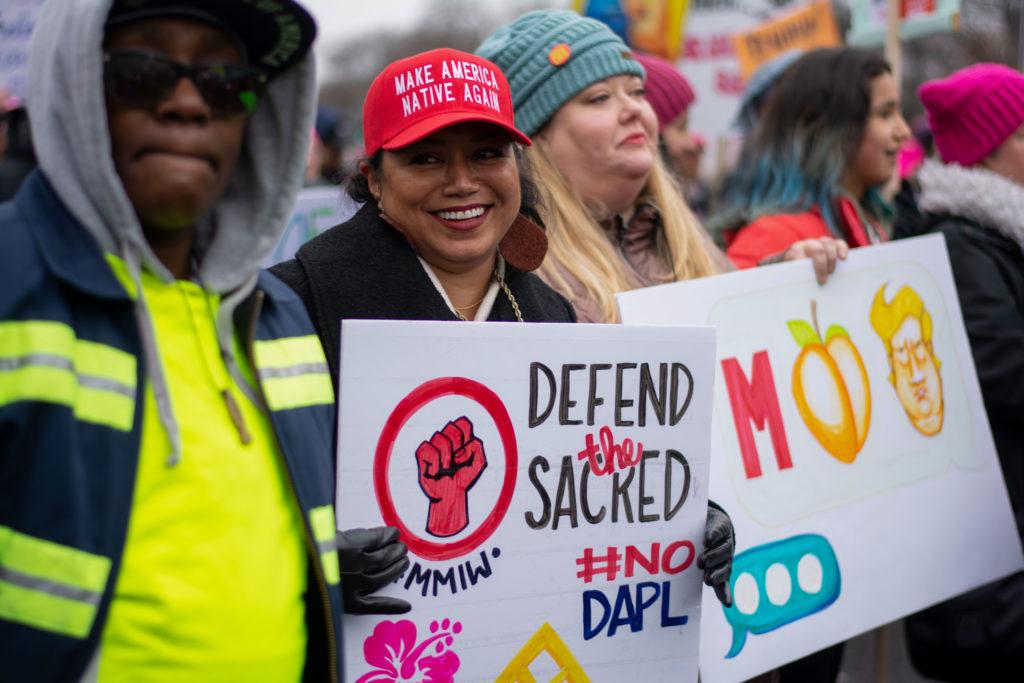Protesters marched from Freedom Plaza to the White House to push for women’s rights, reproductive rights and impeachment Saturday.
An estimated 10,000 protestors attended this year’s D.C. march, the first version of which was organized in 2017 the day after President Donald Trump’s inauguration. Marchers held signs emblazoned with slogans like “Donald Trump belongs in prison” and “I decided I wasn’t bossy, I was strong” and sang the Chilean feminist anthem “Un violador en tu camino,” which translates to “The Rapist is You.”
Hope Butler, a member of Maryland’s Piscataway Conoy Tribe, opened the march by welcoming protestors to her tribe’s territory, which historically encompassed the District and portions of what is now Maryland and Virginia. Butler also spoke at last year’s Women’s March.
“It is a good day to be indigenous, a good day to be a mother, a grandmother, a daughter, a sister, an aunt and most importantly a woman,” she said.
[gwh_image id=”1108205″ credit=”Arielle Bader | Assistant Photo Editor” align=”none” size=”embedded-img”]A protester at the march holds a flag in support of gay rights.[/gwh_image]
Martin Luther King III, the oldest living child of civil rights activist Martin Luther King Jr. and Coretta Scott King, spoke at the rally and honored the women in his life, including his wife, activist Andrea Waters King.
“When women come together, change comes around our nation and the world,” he said.
Andrea Waters King also addressed the audience to tell protesters “eternal diligence” is necessary to secure one’s freedom, urging everyone assembled to push for equality and “make real the promises of democracy” in the new decade.
“It’s ironic that America now more than ever is challenged to realize its dream by fulfilling the dream of Martin Luther King, Jr. and Coretta Scott King,” she said. “In this spirit, we can and we must work to seize the urgency of the moment, for the only way to keep from moving backwards is to keep moving forward.”
[gwh_image id=”1108199″ credit=”Eric Lee | Staff Photographer” size=”embedded-img” align=”none”]Demonstrators yell out during the march.[/gwh_image]
Crowds assembled for the Women’s March were also met with pro-life counter-protesters, who yelled phrases like “God hates you” through a megaphone across the street from Freedom Plaza.
Mansi Patel – the president of March On the Campus GWU, GW’s branch of the Women’s March’s activism branch – said she hopes the “momentum” the march created will fuel activism geared around electing a new president in November.
“March On is really focused on not only just marching but after that, taking that drive and the power of all these women combined to make political action,” Patel said.
Kelly Greene and her daughter, Emily, drove from North Carolina to D.C. for the march after their flight was delayed several hours. She said they attended the march to spend more time together, to march with others and to make their voices heard.
“The most important thing is to show respect for people of color,” she said.
Virginia Anthony, who has lived in the District since the late 1960s, said she has attended the Women’s March every year since 2017 and has marched in D.C. many times since the District hosted several anti-Vietnam War protests. She said she hopes that marching will help build a sense of community.
“We’re hoping to accomplish solidarity today, to make a statement,” Anthony said. “There is something about community that affirms things.”
[gwh_image id=”1108200″ credit=”Sabrina Godin | Staff Photographer” align=”none” size=”embedded-img”]A woman dressed as a character from the Handmaid’s Tale, a dystopian TV series on Hulu, holds a sign reading “Vote While You Still Can!” at the march.[/gwh_image]
Elon University students Katie Canty and Annalise von Sprecken had just completed a two-week political science program in the District and attended the march after their professors moved their bus departure time to later in the day.
Von Sprecken said she was excited to protest in the District, where the march is much larger than in Raleigh, North Carolina, where she has participated in the three previous Women’s Marches.
“I think it’s cool just to be in the middle of a large movement, especially coming from North Carolina,” she said. “I do the Women’s March in Raleigh every year and being at the one here in D.C. is very cool and a lot bigger.”
Canty said the significance of the march is ultimately a reflection of the issues that motivate people to go out and vote, like reproductive rights and immigrants’ rights.
“I think it’s pretty indicative by the sheer amount of people here – people will be out to vote about these issues,” she said.
Ethan Schwartz contributed reporting.





